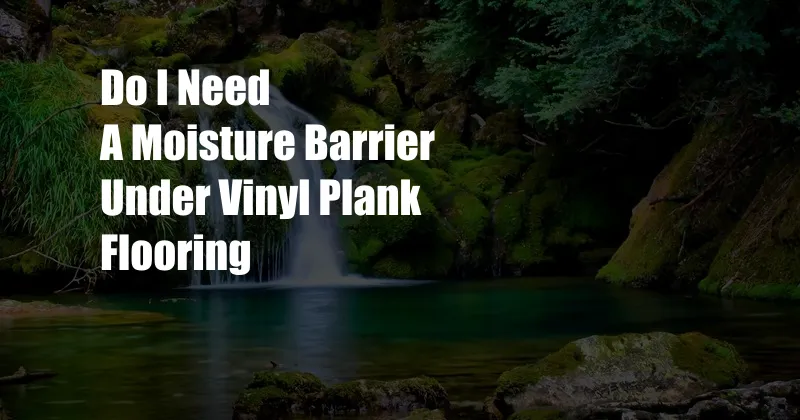
Do I Need a Moisture Barrier Under Vinyl Plank Flooring?
Vinyl plank flooring has become increasingly popular in recent years due to its durability, affordability, and ease of installation. However, one common question that arises when installing vinyl plank flooring is whether or not a moisture barrier is necessary.
A moisture barrier is a thin, plastic sheet that is placed between the subfloor and the vinyl plank flooring. Its purpose is to prevent moisture from the subfloor from reaching the vinyl plank flooring and causing damage. Moisture can cause vinyl plank flooring to buckle, warp, or develop mold and mildew. Therefore, it is generally recommended to use a moisture barrier when installing vinyl plank flooring, especially in areas that are prone to moisture, such as bathrooms, kitchens, and basements.
Moisture barriers are relatively inexpensive and easy to install. They can be purchased at most home improvement stores and come in a variety of sizes to fit any room.
Types of Moisture Barriers
There are two main types of moisture barriers: plastic sheeting and self-adhesive membranes. Plastic sheeting is the most common type of moisture barrier and is typically made of polyethylene or polypropylene. It is inexpensive and easy to install, but it can be difficult to keep in place and may not always be effective in preventing moisture from reaching the vinyl plank flooring.
Self-adhesive membranes are more expensive than plastic sheeting, but they are also more effective at preventing moisture from reaching the vinyl plank flooring. Self-adhesive membranes are made of a rubberized material that adheres to the subfloor and the vinyl plank flooring. They are easy to install and can be cut to fit any room.
How to Install a Moisture Barrier
To install a moisture barrier, simply roll out the plastic sheeting or self-adhesive membrane over the subfloor. Be sure to overlap the edges of the moisture barrier by at least 6 inches. Tape the seams together with duct tape or moisture-resistant tape.
Once the moisture barrier is in place, you can begin installing the vinyl plank flooring. Be sure to follow the manufacturer’s instructions for installing the vinyl plank flooring.
Tips for Installing Vinyl Plank Flooring
Here are a few tips for installing vinyl plank flooring:
• Start by measuring the room and determining how many planks you will need.
• Make sure the subfloor is clean, dry, and level.
• If you are installing vinyl plank flooring in a bathroom or kitchen, use a moisture barrier.
• Follow the manufacturer’s instructions for installing the vinyl plank flooring.
• If you have any questions, consult a professional.
FAQ
Q: Do I need to use a moisture barrier under vinyl plank flooring?
A: Yes, it is generally recommended to use a moisture barrier under vinyl plank flooring, especially in areas that are prone to moisture, such as bathrooms, kitchens, and basements.
Q: What type of moisture barrier should I use?
A: There are two main types of moisture barriers: plastic sheeting and self-adhesive membranes. Plastic sheeting is the most common type of moisture barrier and is typically made of polyethylene or polypropylene. Self-adhesive membranes are more expensive than plastic sheeting, but they are also more effective at preventing moisture from reaching the vinyl plank flooring.
Q: How do I install a moisture barrier?
A: To install a moisture barrier, simply roll out the plastic sheeting or self-adhesive membrane over the subfloor. Be sure to overlap the edges of the moisture barrier by at least 6 inches. Tape the seams together with duct tape or moisture-resistant tape.
Q: What are some tips for installing vinyl plank flooring?
A: Here are a few tips for installing vinyl plank flooring:
Start by measuring the room and determining how many planks you will need.
Make sure the subfloor is clean, dry, and level.
If you are installing vinyl plank flooring in a bathroom or kitchen, use a moisture barrier.
Follow the manufacturer’s instructions for installing the vinyl plank flooring.
If you have any questions, consult a professional.
Conclusion
Vinyl plank flooring is a great choice for any room in your home. It is durable, affordable, and easy to install. By following the tips above, you can ensure that your vinyl plank flooring will last for many years to come.
Are you interested in learning more about vinyl plank flooring? Do you have any questions about installing vinyl plank flooring? Please leave a comment below and I will be happy to help.